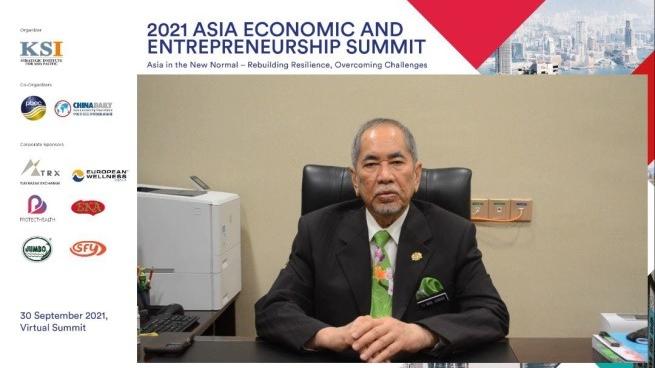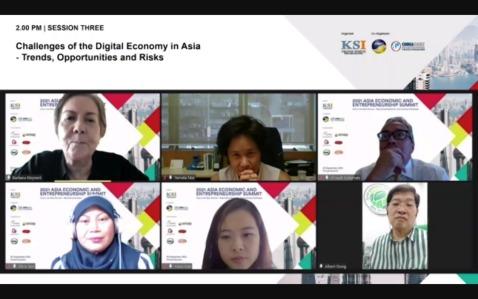 Dato Sri Dr Haji Wan Junaidi bin Tuanku Jaafar, Minister in the Prime Minister's Department (Parliamentary and Legal Affairs), delivers a special ministerial address at the 2021 Asia Economic and Entrepreneurship Summit on Sept 30, 2021. The regional economic forum is co-organized by the Kuala Lumpur-based think tank KSI Strategic Institute for Asia Pacific, the Pacific Basin Economic Council and China Daily. (PROVIDED TO CHINA DAILY)
Dato Sri Dr Haji Wan Junaidi bin Tuanku Jaafar, Minister in the Prime Minister's Department (Parliamentary and Legal Affairs), delivers a special ministerial address at the 2021 Asia Economic and Entrepreneurship Summit on Sept 30, 2021. The regional economic forum is co-organized by the Kuala Lumpur-based think tank KSI Strategic Institute for Asia Pacific, the Pacific Basin Economic Council and China Daily. (PROVIDED TO CHINA DAILY)
Though the pandemic has created disruptions to the global economy, there is a silver lining for Asia as it could lead to the region embracing green development as the path to sustainable recovery, according to speakers and participants at a Kuala Lumpur-based summit on Sept 30.
“The COVID-19 pandemic is only a wake-up call,” said Albert Oung, chair of green economy task force at the United Nations Economic and Social Commission for Asia and the Pacific Sustainable Business Network.
Albert Oung, chair of green economy task force at the United Nations Economic and Social Commission for Asia and the Pacific Sustainable Business Network, said the pandemic has created opportunities for the world to make things change quickly due to technical solutions that are already available
Oung, also founder and president of the World Green Organisation, an environmental NGO based in the Hong Kong Special Administrative Region, said the pandemic has created opportunities for the world to make things change quickly due to technical solutions that are already available.
He was speaking at a panel discussion titled “Meeting the Challenges of Sustainable Development: Towards a Green Economy” during the Asia Economic and Entrepreneurship Summit 2021.
ALSO READ: Infrastructure developments, FTAs key to Asia's recovery
Wan Junaidi bin Tuanku Jaafar, Malaysia’s minister of parliament and law at the Prime Minister’s Department, said in his special ministerial address to the summit that there are several reforms he wishes to introduce that will bring substantial changes in the administration of the Malaysian parliament.
“The transformation of parliament is of paramount importance as it helps in not only (promoting) political stability, but (will also) enable us to handle the COVID-19 pandemic effectively. It provides resilience to the community and businesses in dealing with the current economic situation,” said Wan Junaidi, who spoke on parliamentary and legal reforms to enhance governance and economic prosperity.
Wan Junaidi said the Malaysian government will do more and continue to deliver more benefits for the people, as protecting individuals and businesses is vital for the resumption of economic activities.
With the theme “Asia in the New Normal – Rebuilding Resilience, Overcoming Challenges”, the virtual summit brought together government, business, civil society and thought leaders to discuss the key trends, strategic challenges and major issues impacting business and industry in Asia.
ALSO READ: Use SDGs to fight climate change
The event was co-organized by the KSI Strategic Institute for Asia Pacific, China Daily Asia Leadership Roundtable and the Pacific Basin Economic Council.
On the way forward for the business sector, Oung said he hopes business leaders can be visionary and green.
“The green business model that one can do is … transforming your business in the long-term basis ... and making good to the world,” he said.
“We have had a very good year in Asia on the green front,” said Barbara Meynert, senior advisor of HKSAR-headquartered supply chain solutions firm Fung Group, noting that the Chinese mainland and a number of major countries in the region have set net-zero carbon targets.
 Panelists discuss the challenges and opportunities of sustainable development at the 2021 Asia Economic and Entrepreneurship Summit on Sept 30, 2021. (KELLY YANG / CHINA DAILY)
Panelists discuss the challenges and opportunities of sustainable development at the 2021 Asia Economic and Entrepreneurship Summit on Sept 30, 2021. (KELLY YANG / CHINA DAILY)
Meynert said this move is important because Asia accounts for 35 percent of global emissions.
“We need substantial funding” to achieve the emissions reduction goals, she said.
“A lot of Asian countries don’t have the right (environmental) regulations in place,” said Pamela Mar, executive vice president of knowledge and applications at Fund Academy, the learning arm of Hong Kong-based Fung Group.
ALSO READ: Climate change replaces pandemic as insurers' top worry
Mar said there is a need to have a simple and harmonized regulation that is enforced using data and technology, to reduce the complexity for supply chain operations that usually go through several countries.
Shazali Sulaiman, chairman of Brunei Darussalam International Chambers of Commerce and Industry, said it is important to have good tax incentives for companies that are willing to at least move and transform their business into a much more environmentally friendly model.
Meanwhile, it is also important to have a consistent education system that covers knowledge on sustainable development goals, green environment and the impact of carbon dioxide emissions, said Sulaiman.
During a session titled “Challenges of the Digital Economy in Asia – Trends, Opportunities and Risks”, Chin Yew Sin, advisor for Asia Pacific region at the Global One Belt One Road Association, said the Association of Southeast Asian Nations will have huge potential to develop the region’s digital economy since more than half of its population is under 30 years in age.
Chin said digital technology can allow the regional bloc to grow faster and emerge as the world’s fifth-largest economy, moving up one place from its current sixth position, especially as the ongoing pandemic has spurred the growth of the digital economy.
READ MORE: Over 20 nations found diluting green curbs during pandemic
“We need to look at how China makes full use of this digital technology to achieve economic growth,” said Chin.
To cut short the development stages towards the fourth industrial revolution, he said ASEAN countries can not only cooperate with the mainland in developing physical infrastructure, but also buy or borrow technologies from the Asian giant to develop faster.


